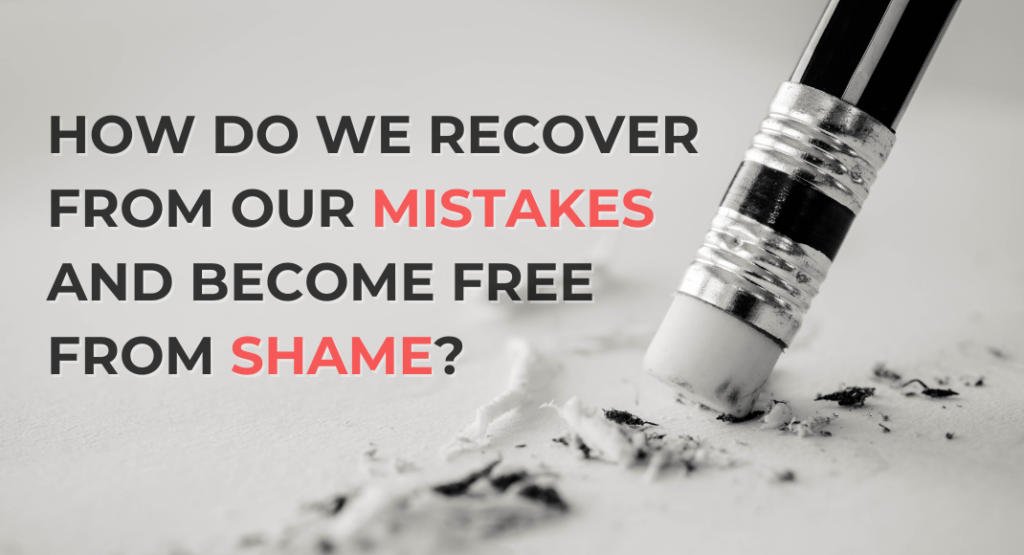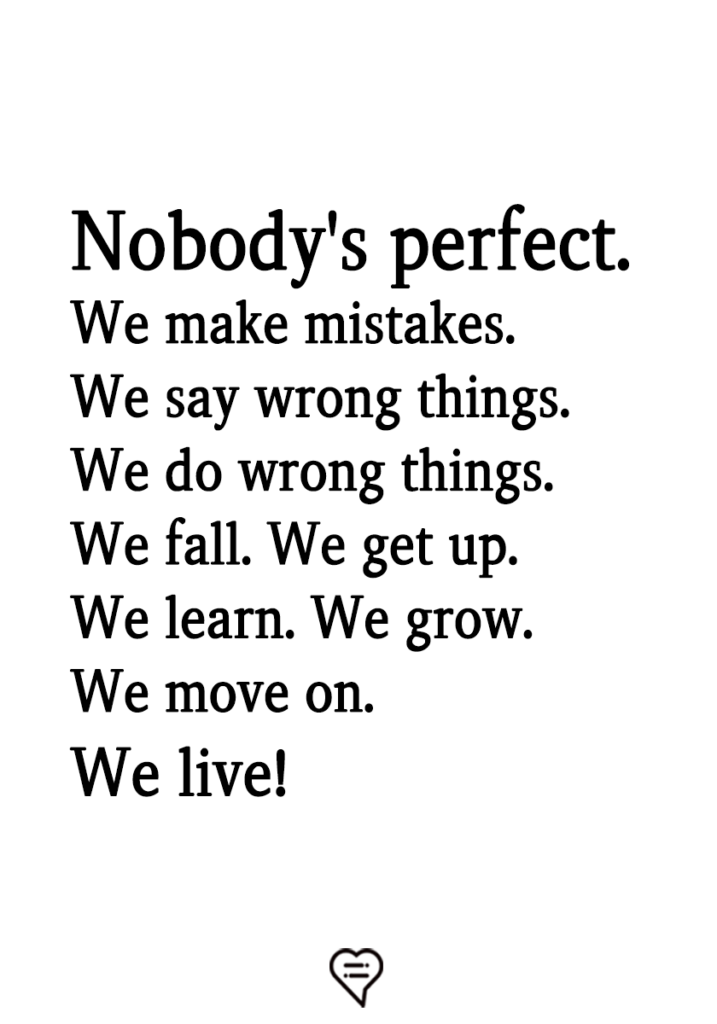How Do We Recover from Our Mistakes and Become Free from Shame?
- Rick J Petronella PhD
- Aug, 08, 2023
- Newsletter
- No Comments
Dr. Rick Petronella

August 2023 Newsletter
How Do We Recover from Our Mistakes and Become Free from Shame?
Recovering from a mistake can be a challenging experience. It can be hard for some to admit when they have made a mistake. For others, it’s a revulsion towards themselves that haunts them for the rest of their lives. It becomes a paralyzing shame they cannot escape. Many don’t realize they do not have to be trapped by this overshadowing feeling. They fear they will never escape the feelings of exposure and that everyone knows what they did.
We’ve all made mistakes, but it’s an important first step to begin to free ourselves from this most shaming paralysis. We must be able to approach it with compassion and understanding towards ourselves. In my own life, I have struggled with my own mistakes. I have been to the point that I have found myself depressed and even distanced myself from being around certain people I value and respect. It has been a challenge to move beyond my shame. In my own personal journey of healing, here are some tips that have helped me to navigate through this process.
- Learn from our mistakes: Every mistake is an opportunity to learn and grow. Take some time to reflect on what happened and what you can take away from the experience.
- Apologize when necessary: If your mistake has hurt someone else, offering a sincere apology is important. This can show that you understand the impact of your actions and that you’re committed to making things right.
- Make amends: When possible, try to fix the mistake or make up for any harm you caused. This can help you move forward and repair any damage that was done. Step 8 in Alcoholics Anonymous.
- Forgive yourself: Be kind to yourself as you work through the recovery process. Remember that everyone makes mistakes, and you’re not alone in this experience. Matthew 22:37-39
- Focus on solutions: Instead of dwelling on what went wrong, try to focus on finding solutions and making things right. This can help you move forward and feel more in control.
- Set new goals: Use what you’ve learned to set new goals and strategies for the future. Be specific and realistic in your planning. What have you learned from this mistake that will make you a better person?
- How can I now, as a better person, begin to live and demonstrate the growth you have had through your mistake?
- Practice self-compassion: It’s important to treat yourself with kindness and understanding during this process. Remember that recovering from a mistake takes time and that it’s okay to make mistakes along the way.
- Seek support: If you need help recovering from a mistake, don’t be afraid to reach out to friends, family, or a professional counselor. Talking about what happened can help you gain new insights and emotional support.
- Embrace a positive mindset: View mistakes as opportunities for learning and growth. See challenges and setbacks as chances to develop and improve.
When we choose to work through the shame, we realize that we must embrace the shame in order to externalize it. In John Bradshaw’s book,” Healing the Shame that Binds,” he writes that the only way out of shame is to enter it. Shame loses its grip as we embrace it and come out of it. The very act of embracing the shame begins a process of change in our hearts.
Sometimes that may mean going to an Alcohol Anonymous meeting or a support group that can be a safe place to process your feelings. For some, it may be going to talk to someone safe. That may be a priest or minister, maybe a therapist. Being honest about your failures and still being accepted by them can be a transformational moment, one of the most freeing feelings one can experience. This experience allows hope to begin again.
The most important point is to not ignore or stuff the shame. You cannot receive it unless you ask. Once you ask, you have already begun receiving help. Remember, shame is about hiding and isolating. In the gospel of John, Jesus says that the truth will set us free. And it truly does.
Remember that overcoming failure and learning from mistakes is a gradual process. It’s essential to have grace with yourself and allow the space to grow and develop over time. Each setback is an opportunity to gain valuable experience and move closer to emotional freedom. NEVER DEFINE YOURSELF BY WHAT YOU DID… The mistakes we make do not define who we are.
They are mistakes that must be forgiven and something we learn more about ourselves as personal growth. Use what you’ve learned to make positive changes in your behavior and decision-making. Take steps to prevent similar mistakes in the future. Remember that recovering from mistakes takes time, so be patient and focus on the positive changes you’re making.

Everyone makes mistakes, and they can provide valuable learning opportunities. How you recover from mistakes and grow as a result is what matters most. Embrace the process of learning from your errors, and use that knowledge to make better choices and decisions in the future.
Feeling wrong or being wrong is a common experience that everyone faces from time to time. It can be uncomfortable and challenging to deal with, but it’s an essential aspect of personal growth and learning.
Nobody is perfect, and setbacks are a natural part of our lives. As we are able to understand this, we can embrace these challenges as opportunities for growth and learning and keep moving forward with determination and resilience.
“I will make beauty from ashes.” Isaiah 61:3. You can’t receive beauty if you don’t give God your ashes.
“I will forgive their sins and remember them no more.” God does not just forgive but chooses not to remember them no more. Jeremiah 31:34.
“Come unto me all that labor and are heavily burdened.” I will give you rest. Matthew 11:28
10 Fears That Keep Us From Finding Happiness
Fear often stands between us and our ability to make decisions, take action, and ask for what we want—even to know what we really want. It is the gatekeeper of our comfort zone. As you read each fear, ask yourself how much energy do I allow myself to waste when these thoughts have consumed you?

Below are 10 fears that commonly get in our way.
1. Fear of being judged. Needing approval from family or peers can keep us from going after dreams and goals.
2. Fear of rejection. Rejection just means that someone else has a different opinion.
3. Fear of emotional pain. Rather than incapacitate us, painful feelings can sharpen our sense of joy and gratitude.
4. Fear of embarrassment. Making mistakes publicly is awful only when we let ourselves feel ashamed.
5. Fear of being alone/abandoned. A strong sense of self-worth and what we can offer the world reduces this fear.
6. Fear of failure. A biggie for most of us and born of the notion that it’s not OK to fail.
7. Fear of success. More responsibility, more attention, and pressure to perform can be frightening when we don’t believe in ourselves.
8. Fear of expressing feelings. An authentic life means being willing to express our true feelings to our loved ones, colleagues, adversaries—even ourselves.
9. Fear of intimacy. Emotional intimacy—really being seen by another—can be as scary as sexual intimacy.
10. Fear of the unknown. The unknown can be exciting and vast if we shift our fear to curiosity.
Which ones can you relate to? What do you want to do to change this in your life? The answers are in the article above. Do not allow these fears to have any more space in your life than they already have.